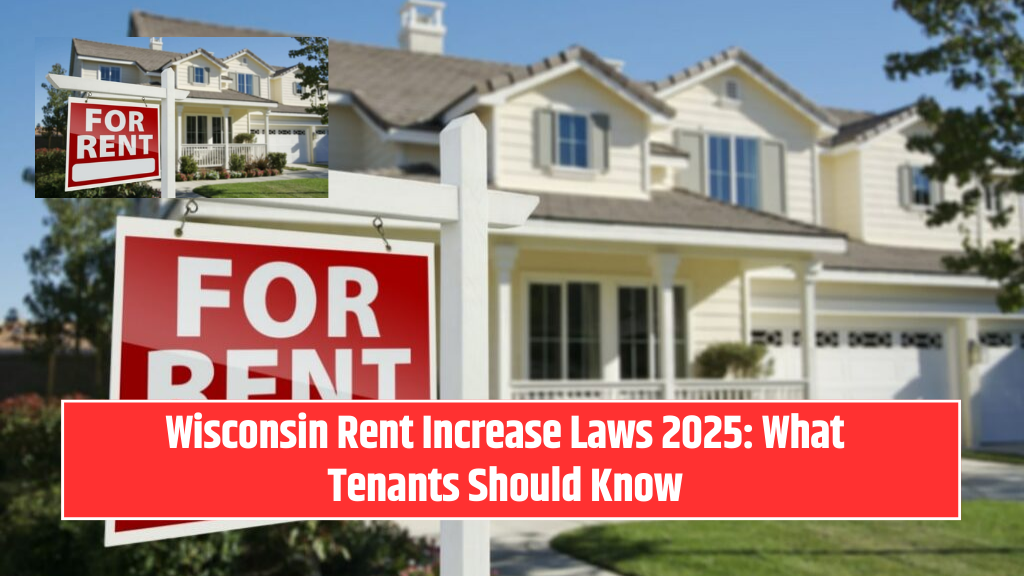In Wisconsin, renters often face challenges when it comes to rising housing costs. Unlike many other states, Wisconsin does not have any statewide rent control laws. This means landlords have the freedom to raise rents as much as they want, as long as they follow proper notice rules. If you’re renting a home or apartment in Wisconsin, understanding your rights and your landlord’s responsibilities is important to avoid surprises.
No Statewide Rent Caps in Wisconsin
Across most of Wisconsin, there is no legal limit on how much landlords can raise the rent. As long as they provide the correct notice based on your lease type, they can increase the rent to any amount. This lack of restriction means landlords can set rent prices based on market demand or their own judgment.
When Can a Landlord Raise Rent?
End of a Lease Term
Landlords can raise rent when a fixed-term lease (like 6 months or 1 year) ends. They must give proper written notice, usually 28 days before the lease ends. If you agree to stay, the new rent applies. If not, you can move out.
During a Month-to-Month Agreement
If you’re renting without a long-term lease, your landlord can raise rent at any time with 28 days’ written notice. There’s no limit to how often or how much they can increase it, but they must notify you in advance.
During a Fixed-Term Lease
Landlords cannot raise the rent in the middle of a lease unless the lease clearly allows for increases. If the lease says nothing about it, the rent amount stays fixed until the lease ends.
Rent-Controlled and Subsidized Housing
Some units in Wisconsin are part of government programs like Section 8 or LIHTC (Low-Income Housing Tax Credit). These have rent limits set by law, and landlords cannot raise rent beyond what’s allowed by the program. If you live in this kind of housing, rent increases are typically tied to inflation or income guidelines, and they must be approved by the housing authority.
Local Ordinances: Are There Any Rent Caps?
Though Wisconsin has no statewide rent control, some cities may have local laws or past efforts to cap rent increases. For example, Madison once had rules that limited increases to 5% plus the inflation rate. These rules have often faced legal challenges and may not be active today, but they show that local rent rules can exist in rare cases.
Required Notice for Rent Increases
The notice period depends on the lease type:
Month-to-Month Lease: At least 28 days’ written notice.
Fixed-Term Lease: Landlords must notify tenants before the lease ends if they want to raise the rent for the next term.
Automatic Renewal Lease: If your lease renews automatically, the landlord must follow the notice period stated in the lease, which is usually 60 to 90 days.
The written notice should clearly state how much the new rent will be and when it starts.
Can a Landlord Raise Rent Just to Get Back at You?
No. Wisconsin law protects tenants from retaliatory rent increases. If a landlord raises your rent soon after you complain about repairs, health violations, or organize with other tenants, it might be illegal. If you believe this is happening, you can file a complaint with the Wisconsin Department of Agriculture, Trade and Consumer Protection (DATCP).
How Often Can Rent Be Increased?
There is no limit on how often a landlord can raise rent—except during a fixed lease term. For example, if you have a 1-year lease, your rent cannot change during that year unless the lease says otherwise. In month-to-month agreements, however, landlords can raise the rent every month with proper notice.
What Can You Do About a Large Rent Hike?
Sadly, your legal options are limited unless the increase is retaliatory or you’re in a subsidized unit. Here’s what you can do:
Try to negotiate with your landlord. If you’ve been a good tenant, they might agree to a smaller increase.
Show proof of your financial situation—like recent bills or income statements—to support your request.
Compare your rent with similar properties in your area and use that information to negotiate.
If negotiations fail and the rent becomes unaffordable, your best option may be to find a more affordable unit.
Living in Wisconsin means renters must be prepared for possible rent hikes. With no statewide rent control, landlords have wide freedom to increase rent—sometimes without much warning. While certain protections exist for tenants in subsidized housing or in cases of retaliation, most renters have little legal support when it comes to large rent increases. Always read your lease carefully and make sure you know your rights when signing or renewing a rental agreement.














